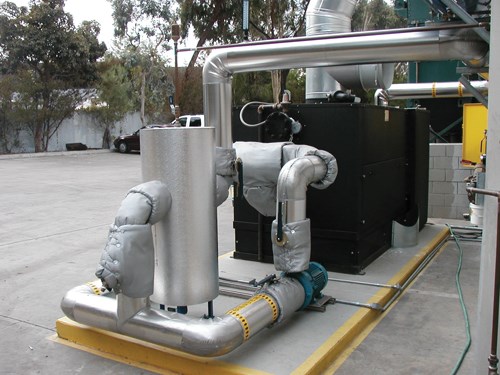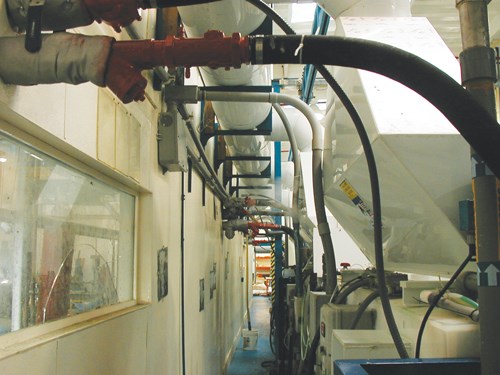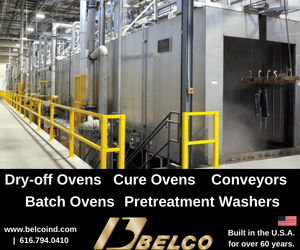Steamed Over Heating Costs? Try Gas For Your Finishing Shop
The cost of natural gas in the U.S. is at record lows—about where the rates were in the mid-1970s—causing many in the plating industry who need to heat tanks to search for alternative avenues to curtail their rising energy costs.
These lower gas prices have been a boom for Parker Boiler Co., a Los Angeles-based manufacturer of steam and hot water boilers, thermal liquid heaters and indirect water heaters, as well as condensing boilers.
Founded in 1946, Parker Boiler makes steam boilers from 1.5 to 150 hp with pressures as high as 250 psi that are capable of delivering dry steam in less than 10 min. Parker Boiler’s most popular product line for the plating industry primarily has been direct-fired hot water boilers, available as gas, oil, propane or combination-fired. They range from 300,000 to 6.8 million Btu with operating temperatures to 400°F (650°F with special fluids) and pressures to 300 psi.
Michael Leeming, Parker Boiler’s sales manager, says all of the company’s products are built to ASME Section 1 and/or IV specifications, National Board Registered, and listed by either UL or ETL independent testing labs per UL 795 as a complete gas fired boiler assembly. He says all low-NOx units offer 2.0 MM Btu input and bellow and are pre-certified from the South Coast Air Quality Management District to meet Rule 1146.2, and that all boilers, including the larger models,can meet any “Best Available Control Technology” requirements in the country.
“Our focus in the process and metal finishing industry has been to inform the OEM or end user of how much energy can be saved with a medium- and high-temperature hot water system over other technologies, such as a steam boiler which has lower efficiency, higher cost to inspect and maintain, and direct immersion burners or electrically heated elements, which are also not as efficient or safe,” Leeming says.
Several years ago, with the continually rising cost of electric power, Sheffield Platers, one of the premier metal finishers in the nearby San Diego area, began looking for alternatives to using electric heaters for tanks. Sheffield President Dale Watkins and his company’s engineering manager, Stephen Parkhurst, soon decided on a Parker Boiler natural-gas-fired hot water boiler that circulates medium-temperature water at about 240°F through heat exchange coils immersed in their tanks.
“Our main concerns were reducing operating costs and improving shop safety—mainly the potential for an electrical fire,” Watkins says. “The two reasonable options were a steam or hot water boiler. Due to regulatory concerns and our temperature needs, we decided that a hot water boiler would be the best.”
Parker Boiler’s Doug Johnson handled the equipment sale and oversaw the installation by Pacific Rim Mechanical, a San Diego-based mechanical contractor.
Watkins says that the modifications meant that all heated process solutions needed to be retrofitted with hot water heat exchangers in lieu of electric immersion heaters. The shop needed to be plumbed to circulate the hot water to each tank, and the heat exchangers were all sized for a two-hour heat up time.
“This was an added cost, though it gives us much greater processing flexibility and was well-worth the added expense,” Watkins says. Sheffield also needed to put a slab behind its plant for the unit to be placed on.
It took seven months from the early design stages until Sheffield was 100-percent dependent on the boiler. The ROI was about two years.
“Ultimately, I wish I would have done it sooner,” Watkins says. “Being in California, we are held hostage to electric power rationing, exorbitant over-usage penalties of as much as 500 percent and price increases that will only become more common.”
Watkins says that, due to improvements in natural gas delivery systems to California, his costs have actually been reduced by as much as 60 percent. A comparison of utility bills before and after the switch from electric heat to gas-fired hot water heat shows a first-year savings of more than $41,000.
Watkins says his company is no longer buying electrical heaters as they are consumable items in plating shops that always needed to be replaced and that the boiler has no consumable parts.
“There is no need to put in new electrical panels and transformers, or run new wire and conduit,” he says. “I would say that we are easily saving $20,000 yearly on electrical upgrades and replacement costs to keep things safe and up to code.”
The other big savings that Sheffield has found is when a new process tank is added on the line, the company no longer needs to purchase heaters, run wire from panels and add all the extras that go with it.
“That cost has been reduced by 80 percent simply because all we need is a stainless steel heat exchanger, a solenoid valve and some copper pipe to get the job done,” Watkins says.
The Parker Boiler system has been in operation for more than three years now and has been doing a better heating job than the electric heaters, he says.
“Their comfort level is high with this system, as removal of the electric heaters has eliminated the need for expensive replacement heaters, as well as the potential risk of overheating and fire,” Leeming says. “The system was sized to accommodate future expansion, and Sheffield has since added a significant load to the system with no adverse effects.”
Related Content
NASF/AESF Foundation Research Project #123: Electrochemical Manufacturing for Energy Applications – 4th and 5th Quarter Report
The NASF-AESF Foundation Research Board selected a project on electrodeposition toward developing low-cost and scalable manufacturing processes for hydrogen fuel cells and electrolysis cells for clean transportation and distributed power applications. During the reporting period, efforts were focused on planning the overall project work, with the eventual goal of manufacturing an improved design for a Solid oxide fuel cell anode supported flat tube (SOFC).
Read MorePPG Paints, Coatings for Battery EVs Showcased at Germany Battery Show
PPG is attending The Battery Show in Stuttgart, Germany.
Read MoreCordless Sprayer Offers 3 Configurations
Titan’s Impact X 120 18V sprayer delivers up to 4 gallons per charge, reducing overspray by 50% and using a single battery system for multiple tools.
Read MoreRevolutionizing Battery Production for Electromobility
Fully automated process combines ultrafine cleaning and protective UV coating for battery cells, replacing the need for traditional film wrapping.
Read MoreRead Next
Resolving Cure Oven Heating Issues
As industrial ovens, dryers and heaters age, questions normally arise about their performance: Are they generating insufficient heat? Are they performing inefficiently? Do I need to replace or refurbish the oven?
Read MoreDelivering Increased Benefits to Greenhouse Films
Baystar's Borstar technology is helping customers deliver better, more reliable production methods to greenhouse agriculture.
Read MoreA ‘Clean’ Agenda Offers Unique Presentations in Chicago
The 2024 Parts Cleaning Conference, co-located with the International Manufacturing Technology Show, includes presentations by several speakers who are new to the conference and topics that have not been covered in past editions of this event.
Read More















.jpg;maxWidth=300;quality=90)








